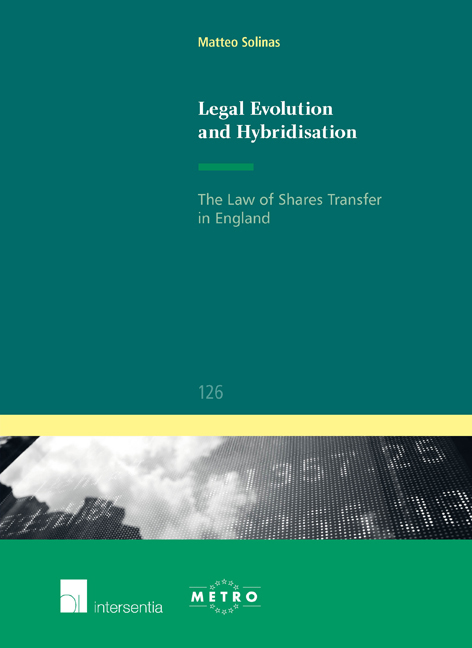Book contents
- Frontmatter
- Foreword
- Preface
- Acknowledgements
- Contents
- Table of Cases
- Introduction
- PART I THE IDEA OF HYBRIDITY IN COMPARATIVE LAW
- Chapter 1 The Debate on the Diffusion of Law
- Chapter 2 The Leitmotif of the Book
- Chapter 3 Hybridisation and Legal Reception
- Summary of Part I
- PART II THE CIRCULATION OF SHARES
- PART III THE TRANSFER OF (INTERESTS IN) SHARES
- Summary of Part III
- Conclusions
- Bibliography
- IUS COMMUNE EUROPAEUM
Chapter 3 - Hybridisation and Legal Reception
from PART I - THE IDEA OF HYBRIDITY IN COMPARATIVE LAW
Published online by Cambridge University Press: 22 November 2017
- Frontmatter
- Foreword
- Preface
- Acknowledgements
- Contents
- Table of Cases
- Introduction
- PART I THE IDEA OF HYBRIDITY IN COMPARATIVE LAW
- Chapter 1 The Debate on the Diffusion of Law
- Chapter 2 The Leitmotif of the Book
- Chapter 3 Hybridisation and Legal Reception
- Summary of Part I
- PART II THE CIRCULATION OF SHARES
- PART III THE TRANSFER OF (INTERESTS IN) SHARES
- Summary of Part III
- Conclusions
- Bibliography
- IUS COMMUNE EUROPAEUM
Summary
Chapter 2 has shown that the idea of hybridity originating in postcolonial theory is applicable outside the boundaries of modern colonialism. It is a powerful tool to understanding the pattern of cultural change both under hegemonic and non-hegemonic contact situations. It may be of great relevance for social sciences in general. This chapter, by way of analogy with postcolonial discourse, argues for its employment in law. The process of hybridisation, it claims, is a formidable conceptual means to explain some of the complexities of the pattern of legal change, to refine and provide contents to the observation of the reception of law.
Analogy
Introduction
As discussed above, the significance of legal borrowing as one of the most fertile sources of the evolution of law in the western world is undeniable. Historical evidence leads to the conclusion that legal change often follows from the stimulus of foreign models. Borrowing, however, is not peculiar to law. It reflects a general phenomenon of any sociocultural system. Merely observing the episodes of borrowing in itself explains little about the characteristics of the process of development of law. It is a superficial achievement. While it is ‘an important corrective to provincialism in the writing of legal history which, like most other forms of history, has been primarily national history’, it does not provide, among other things, a satisfactory explanation for the phenomenon of assimilation and the interaction between legal cultures.
In this light, the rigid perception of legal change suggested by the theorisation of ‘legal transplants’ is not helpful. It tends to oversimplify the pattern of reception and the relationship between legal paradigms. Hybridisation instead recognises the complexities of cross-cultural exchange and gives meaning to the consequences of borrowing. The interaction between cultures proceeds with the illusion of transferable forms and transparent knowledge, ‘but leads increasingly into resistant, opaque and dissonant exchanges. It is in this tension that a “third space” emerges which can affect forms of political change that go beyond antagonistic binarisms between rulers and ruled’.
Colonialism and the Process of Legal Borrowing
Building on this general understanding of the process of culture contact, this study finds an interesting analogy between the dynamics at the basis of colonialism and the movement of law from one country to another.
- Type
- Chapter
- Information
- Legal Evolution and Hybridisation , pp. 35 - 44Publisher: IntersentiaPrint publication year: 2014



